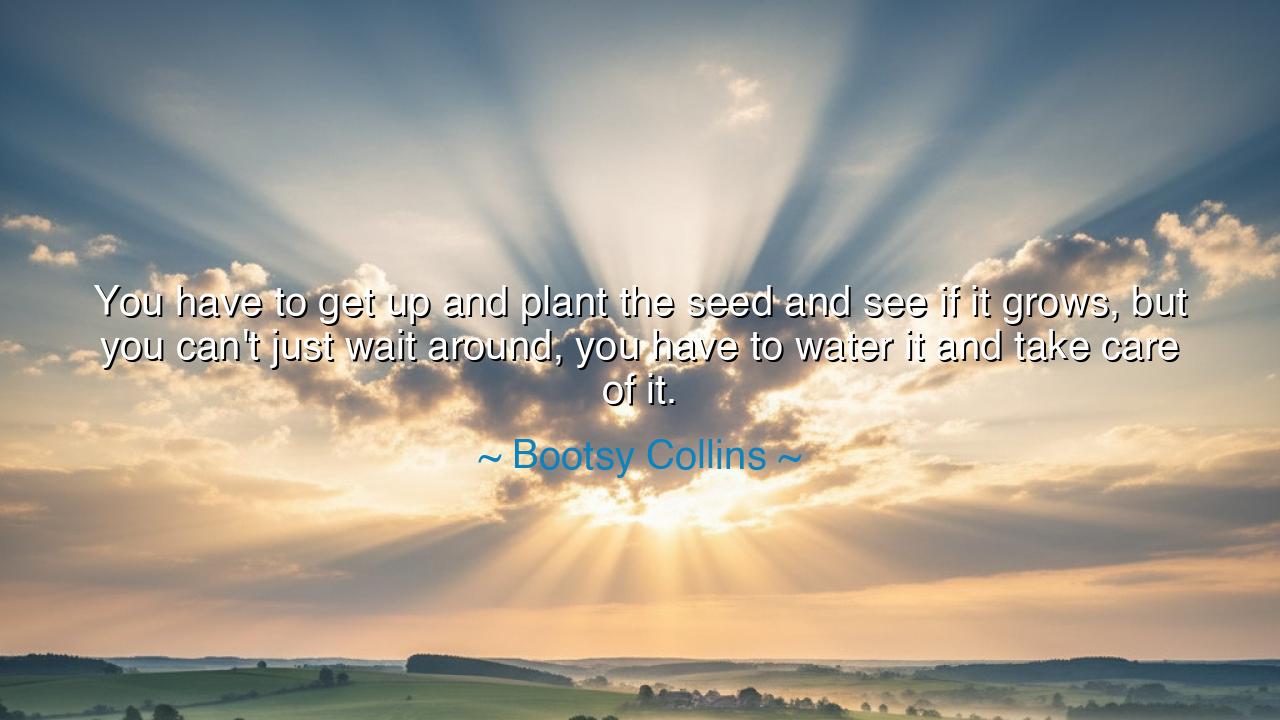
You have to get up and plant the seed and see if it grows, but
You have to get up and plant the seed and see if it grows, but you can't just wait around, you have to water it and take care of it.






In the unfolding tapestry of life, there are moments of stillness, but there are also moments when the world calls for action. Bootsy Collins’s words, "You have to get up and plant the seed and see if it grows, but you can't just wait around, you have to water it and take care of it," carry within them a timeless truth that transcends time and culture. The seed is a metaphor for all that we seek to create in our lives—our dreams, our goals, and our potential. But merely planting the seed, merely beginning the journey, is not enough. To see the fruits of our labor, we must nurture them, tend to them with care, and remain steadfast in our dedication. The seed will not grow by magic; it requires work, effort, and a commitment to the process.
The ancients understood this truth well. The Greeks, in particular, had a deep reverence for the process of growth—both in the natural world and in the human soul. Aristotle, in his writings, spoke of eudaimonia, or flourishing, as the highest good. This flourishing, he said, came not by chance, but through purposeful effort—the cultivation of one’s virtues and the careful tending of one’s life. Just as a farmer plants his seeds and works tirelessly to care for his crops, so too must the wise individual work diligently to shape their character and destiny. Bootsy Collins echoes this ancient wisdom when he speaks of not merely waiting for things to happen, but of actively engaging with the world and nurturing what has been set into motion.
The Romans, too, understood that growth required both patience and action. The great poet Virgil wrote extensively about agriculture in his work Georgics, where he celebrated the tireless work of farmers and gardeners. For Virgil, the act of planting and tending to the earth was a spiritual one, a way of connecting with the divine. But this connection, he reminds us, is not passive; it requires constant vigilance and care. In this way, the garden becomes a symbol of life itself, where the work we put in determines the bounty we receive. Collins’ quote reminds us that it is not enough to plant the seed of our desires; we must water, nurture, and tend to them if we wish to see them grow.
Similarly, in the ancient wisdom of India, the act of cultivating one’s self is likened to the tending of a garden. The Bhagavad Gita, a sacred text of Hinduism, speaks of life as a process of sowing and reaping, where the seeds we plant through our actions, thoughts, and intentions ultimately lead to the fruits of our karma. The yogi, like the gardener, must tend to his inner garden with care and discipline. Patience, effort, and dedication are required for the growth of wisdom, enlightenment, and spiritual peace. Just as the gardener waters the soil and ensures the health of the plants, so too must the seeker tend to the garden of their own mind and soul, ensuring that the seeds of good actions are nourished and allowed to grow.
In the life of Thomas Edison, we find a modern example of the principle Bootsy Collins speaks of. Edison, whose inventions changed the world, was relentless in his efforts. He did not wait for success to come to him; he planted the seeds of his ideas and worked tirelessly to cultivate them. Even after countless failures, he did not stop—he kept watering his ideas, learning from each misstep, and applying his knowledge until his work bore fruit. Edison famously said, “I have not failed. I’ve just found 10,000 ways that won’t work.” His success, like the garden, was not an accident but the result of persistent effort. In the same way, Collins’ advice calls us to put in the work, even when the results are not immediately visible, knowing that the care we give to our endeavors will eventually bring growth.
The lesson in Collins’ words is one of determination and action. It is not enough to dream of a life, a goal, or a vision. Just as the farmer must toil under the sun and wind to ensure his crops grow, so must we put in the work necessary to see our aspirations come to fruition. Waiting passively for life to unfold will not yield the results we desire. We must get up, plant the seeds of our dreams, and then nurture them with consistent effort and faith. Life, like a garden, requires commitment and patience, but also the willingness to face the hardships of the growing process. Every obstacle, every failure, is but a lesson that helps us tend to our garden more wisely.
We must take the words of Bootsy Collins and the wisdom of the ancients to heart. Let us plant the seeds of our dreams, but let us also be vigilant in watering, caring for, and nurturing them. Whether in our work, our relationships, or our personal growth, we must actively engage with life, knowing that success comes not through waiting but through effort. Let us not shy away from the work required to grow, but embrace it with the knowledge that each step taken in dedication brings us closer to the fruits of our labor. Like the gardener, we are called to nurture the seeds we plant in life, and in doing so, we will see them bloom into something beautiful and lasting.






AAdministratorAdministrator
Welcome, honored guests. Please leave a comment, we will respond soon